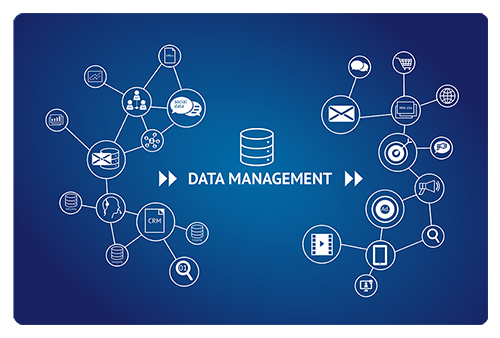The 21st century is fast becoming the age of disruptive technologies like Artificial Intelligence, Big Data, and the Internet of Things (IoT). Among these, AI is making great headway in terms of transforming the data management systems to facilitate accelerated growth of businesses. Let’s see how!

Nearly 95% of top-level executives are of the opinion that data is an integral part of business strategy formulation. This fact highlights the importance of data and how it has emerged as a monetized business asset.
However, to make effective use of data, it needs to be analyzed, and before that, it needs to be stored and managed. Let’s take a look at how the data management industry is being reshaped with the advent of artificial intelligence technologies.
The Importance of Data Management

While capturing data is important, managing it is even more essential, to interpret and make sense of it. Data Management involves acquiring, planning, validating, storing, organizing, protecting, and processing data. All these data-related activities must be carried out securely and cost-efficiently.
Here’s a snapshot of why data management is important:
- Enhanced Productivity: Organized and readily accessible data makes it easier for businesses to be highly productive and stay on top of their game.
- Smoother Operations: Different units of the organization can operate cohesively as they can communicate data effectively without any losses.
- Robust Security: With the responsibility of handling high volumes of sensitive information, it is imperative to ensure data security.
- Cost-Effectiveness: Having a reliable data management system in place ensures smooth sailing in terms of future problems and the costs involved in fixing it.
- Negligible Data Loss: Data loss is a serious problem that many companies face. Data management systems not only prevent data losses but also create backups to retrieve your data in case of system failures.
- Improved Decision-Making Capacity: With easy access to centrally-located organized data, the decision-making capacity of the company is greatly enhanced, making it a vital resource in the long run.
- Improved Data Quality: Better data management means better data quality.
However, in a survey carried out by Corinium Digital, the following gaps came to light:
- 70% percent of respondents said that their data management teams struggle with data analytics solutions
- 38% cited data quality as a problem
- 15% of respondents were not confident in their data
This situation calls for seeking effective Data Management solutions in order to exploit the best of data management.
What is Artificial Intelligence?
Artificial Intelligence, or AI, allows for the simulation of human intelligence by computer systems and machines. It emphasizes the following core cognitive skills – learning, reasoning, and self-correction.

AI combines linguistics, biology, human psychology, and computer science. It is widely used in gaming, speech recognition, robotics, expert systems, and natural language processing (NLP), to name a few industries.
Four Main Types of AI
Before understanding the role of AI in the data management industry, let us take a look at the four broad categories of AI. These are:
1. Reactive AI
Reactive AI systems do not possess any memory and are task-specific.
Example: Deep Blue by IBM. While Deep Blue is well-known for beating Garry Kasparov in a game of chess in the 1990s, the AI is only capable of identifying chess pieces and making predictions and cannot store past experiences to learn from them.
2. Limited Memory AI
These AI systems are supported by a memory storage unit that can record past experiences and use them to make informed decisions in the future.
Example: Self-driving cars are a form of limited memory AI.
3. Theory of Mind
This type of AI system makes use of human psychology (hence the term, “theory of mind”) to understand and interpret various emotions of different individuals. They are capable of gauging emotions and predicting subsequent behavior that accompanies this emotion.
Theory of Mind AI is currently work-in-progress.
4. Self-aware AI
The self-aware AI is a top-tier system that has a sense of being and self. Thus, they are conscious AI systems that understand their current state.
No self-aware AI has been developed as of yet.
How AI is Shaping the Data Management Industry
The effect of artificial intelligence proliferation in the data management of various industries can be seen as follows:
1. AI in Healthcare and Wellness

As an estimate, nearly 90% of AI used in the healthcare and wellness industry revolves around record management and tracing, storing, and re-formatting data. Using AI, the stored data regarding patient history, test results, and reports like CT scans, X-rays, etc. can be passively analyzed. The interception of AI in data management offers opportunities to customize treatments. It is reported that the healthcare sector will be spending over USD 60 million on employing AI for data management.
2. AI in Production and Manufacturing

The current era can be defined as the Fourth Industrial Revolution, with internet technologies disrupting the markets. Cutting-edge technologies like virtual reality, augmented reality, robotics, artificial intelligence, big data, quantum computing, internet of things (IoT) are ushering in a new era of how we live our lives.
Given that the manufacturing units are generating terabytes of data, which is priceless and calls for extreme care in storage and management. Manufacturers experience revenue erosion of nearly 27% due to poor data management, which can be combated with the introduction of AI.
3. AI in Realty and Real Estate
Even though the real estate sector is labor-intensive and requires human-intervention, the combination of AI and data management is changing this scenario. Digital data is contributing to improved productivity and efficiency.
At the same time, AI helps in handling large volumes of data pertaining to legal papers, sales details, property appraisal reports, zoning regulations, property ownership history, and more. It also helps in lead generation as it can analyze past sales reports and locate the properties that have a higher probability of selling. It can also assess the latest trends to price the property accurately.
The Way Ahead
Artificial Intelligence is positively leaving an indelible mark on the world. Given its potential to evolve, it is evident that AI will seep into multiple industries for various positions, with data management being one of them. The coupling of data management and AI is bound to generate new ideas, innovative products, and improved applications, which is a clear indication that AI in data management is here to stay!
